Pakistan has issued official petroleum prices that will remained applicable till December 31, 2022. The official prices of petroleum products from December 16, 2022 to December 31, 2022 are:
(more…)Category: Energy
You can go through stories related to energy. The stories are about changes in petroleum prices and updates on energy sector of Pakistan and world.
-
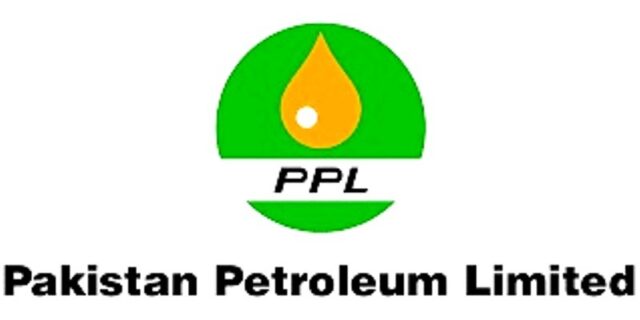
Pakistan Petroleum signs agreement for Reko Diq Project
KARACHI: Pakistan Petroleum Limited (PPL) has announced signing of an agreement for reconstituted Reko Diq Project.
(more…) -

Pakistan sharply cuts petroleum prices effective from Dec 16, 2022
ISLAMABAD: Pakistan on Thursday sharply reduced the prices of petroleum products for next fortnight effective from December 16, 2022.
(more…) -
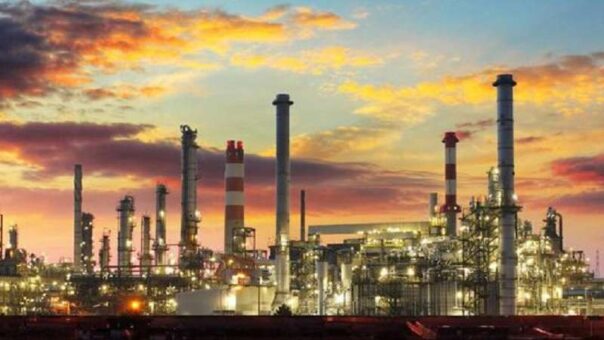
Attock Refinery shuts down distillation unit
KARACHI: Attock Refinery Limited on Tuesday announced a temporary shutdown of its distillation unit due to ullage constraints.
In a communication shared with the Pakistan Stock Exchange (PSX), the company informed that due to ullage constraints from low demand for furnace fuel oil, Attock Refinery Limited is temporarily shutting down its main distillation unit for approximately eight days.
“During this period some necessary maintenance jobs would also be carried out,” the company added.
Consequently, as result of this shut down refinery will be operating at capacity of 35 per cent.
However, adequate inventories of products are available to meeting the current requirements, the company added.
“This has been intimated to the ministry of energy (petroleum division) and Oil and Gas Regulatory Authority (OGRA) accordingly,” the company said.
-
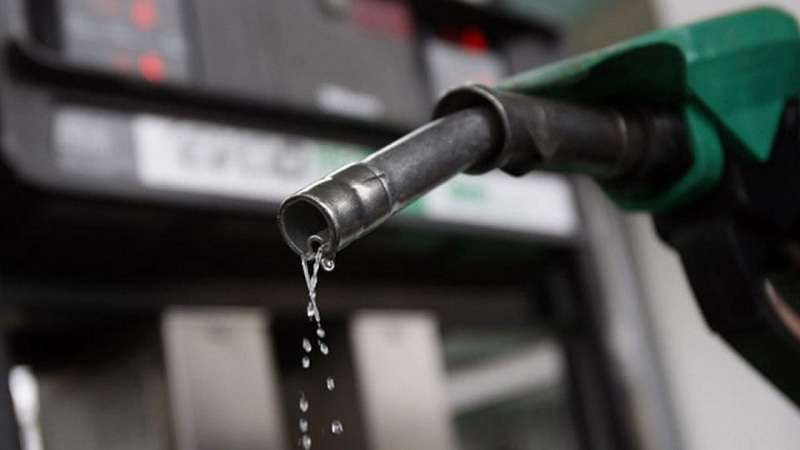
Pakistan may cut petroleum prices on Dec 15, 2022
Pakistan may reduce petroleum prices on December 15 to be effective for last fortnight of the year 2022. Experts believe that the government may reduce the prices of petroleum products in the wake of sharp decline in oil prices in global markets.
Benchmark Brent crude is ended at $76 per barrel in the international trade. The Brent crude has hit above $120 per barrel during mid-June this year and now fell to the present level leaving ample room to the present government to revise downward the prices to provide relief the domestic consumers.
READ MORE: New petroleum prices in Pakistan effective from December 01, 2022
An energy expert told PkRevenue that the country may revise the petroleum prices for the next fortnight amid sharp fall in international oil prices.
However, on the other hand the depreciation in rupee value and imminent imposition of sales tax on petroleum products the benefit of decline in international oil prices may not pass on to domestic consumers.
READ MORE: Pakistan may impose petroleum tax to avert revenue shortfall
The expert believed that the imposition of sales tax on petroleum products would increase the retail prices as well as result in high inflation.
However, experts believed that rise in petroleum prices were imminent in the next review as the government was under immense pressure from the IMF to impose sales tax on petroleum products.
At present the government adopted a policy to keep zero sales tax on petroleum products instead flat rate of 17 per cent. Furthermore, the government also committed to apply petroleum levy to generate more revenue for curtailing budget deficit.
READ MORE: Petroleum prices in Pakistan for next fortnight effective from November 16, 2022
The government on December 01, 2022 revised the latest petroleum prices. According to a notification, the prices of petroleum products with effect from December 01, 2022 till December 15, 2022 are be as follows:
Petrol price will be remained unchanged at Rs224.80 per liter.
The rate of high speed diesel (HSD) will also be remained unchanged at Rs235.30 per liter.
The price of kerosene has been reduced by Rs10 per liter to Rs181.83 from Rs191.30.
READ MORE: Petroleum prices in Pakistan effective from November 01, 2022
Likewise, the price of light diesel oil has been reduced by Rs7.50 per liter to Rs179.00 from Rs186.50.
The exchange rate is again showing a deterioration in rupee value against the dollar. The US dollar continued to make gain against the Pakistani Rupee (PKR) on December 09, 2022 and reached PKR 224.40 in the interbank foreign exchange market.
-
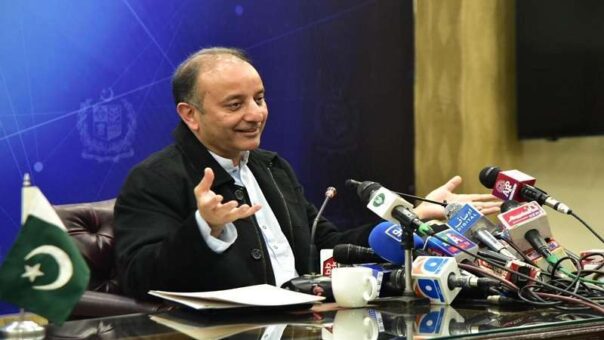
Russia agrees to provide oil at discounted rate to Pakistan: minister
ISLAMABAD: Russia has agreed to provide oil at discounted rate to Pakistan, said Minister of State for Petroleum Dr Musadik Malik on Monday.
He termed his recent visit to Russia ‘very successful’ as the host country, in principle, had decided to provide crude oil, refined petrol and diesel to Pakistan at a discounted rate.
READ MORE: Pakistan unable to bear heavy energy import bill amid challenges to economy: PM
“In addition, negotiations with private sector companies of Russia have been initiated for procurement of Liquefied Natural Gas (LNG), while talks for long term contracts with public sector companies of Russia have also been initiated to get LNG from their new plants,” he said at a press conference.
During the visit, he said fruitful discussions were also held on gas pipeline projects including establishing of Pakistan Stream Gas Pipeline, commonly known North-South (Lahore-Karachi) Gas Pipeline, and another a ‘big gas pipeline’ to get the commodity from Russian hydrocarbon deposits.
READ MORE: SBP denies restricting import payment for petroleum products
Musadik Malik said an inter-governmental delegation of Russia, led by its Energy Minister, would visit Pakistan by January-mid [next month] to make progress on oil and gas sale-purchase agreements between the two countries.
Commenting on the current gas supply situation in the country, the minister said the local gas production was witnessing around 8-10 per cent decline annually and despite all these odds, the government had arranged extra gas for months of November, December and January as compared to the same months of the last year.
He said an effective monitoring system of gas supply to domestic consumers was in place, under which the Petroleum Division kept a vigil eye on the demand and supply of the commodity.
READ MORE: New petroleum prices in Pakistan effective from December 01, 2022
Musadik Malik said the gas companies had been directed to ensure gas supply, especially during ‘breakfast, lunch and dinner’ preparation timings i.e. 6-9 a.m., 12-2 p.m. and 6-9 p.m.
“The incumbent government is providing extra gas as compared to the last year, and monitoring the supply situation regularly,” he added.
However, he said there was a problem of poor infrastructure which created a gas pressure issue for the remote areas, which was being rectified on priority basis.
To bridge the demand and supply gap, the minister said the gas companies were providing more than 20,000 tons Liquefied Petroleum Gas (LPG) per month in the areas where gas-pressure issue and shortage prevailed.
READ MORE: Shell Pakistan signs ABHI for voluntary carbon compensation offer
He disclosed that Iran had announced to give Pakistan LPG worth two million pounds as ‘assistance,’ for which all formalities have been completed. He said the additional LPG would help ensure better gas supply to domestic consumers in December.
The minister was of the view that the government believed in providing sufficient energy to the industrial sector as it would help move the economic wheel at a fast pace, thus generating employment opportunities for youth and increasing the country’s exports.
Accordingly, he said the government was utilizing all available options and contacting different countries including Central Asian States to meet its energy requirements.
He highlighted the importance of exploiting the country’s indigenous oil and gas potential, saying that two new policies related to tight gas and revival of old hydrocarbon wells, were being worked out.
Musadik Malik said the country needed 8-10 per cent addition in energy efficiency, if it wanted to improve Gross Domestic Product (GDP) at the rate of 5-6 per cent annually.
-
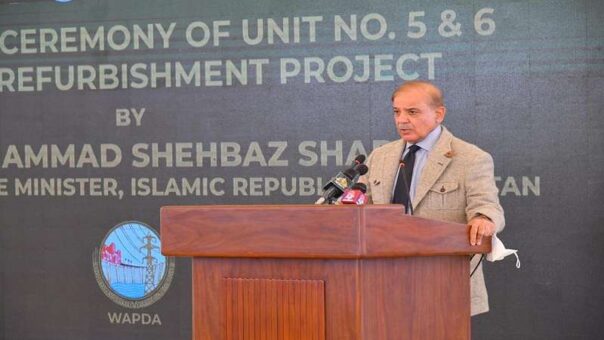
Pakistan unable to bear heavy energy import bill amid challenges to economy: PM
MANGLA: Prime Minister Shehbaz Sharif on Monday said that Pakistan is unable to bear the cost of heavy energy import bills in a situation when the economy is facing immense challenges.
He said Pakistan was in dire need of generating cheap electricity as the energy import bill exorbitantly touched $27 billion.
He was addressing the inaugural ceremony of the refurbishment project of Units 5 and 6 of the Mangla Dam Hydroelectric Power Plant, carried out with the support of the United States Agency for International Development (USAID).
READ MORE: SBP denies restricting import payment for petroleum products
PM Shehbaz Sharif said Pakistan, which was already facing immense challenges of economic stability, could not bear the heavy costs of energy import bills and thus needed to utilize alternative sources of electricity production.
He regretted that in 75 years, both democratic and military rulers were responsible for not building sufficient dams to meet the energy needs.
“Had the water reservoirs built on time, the country’s energy import bill would not have swelled to $27 billion,” he said, pointing out that “powerful lobbies and cartels” did not let materialize the construction of dams and launch of solar power projects.
READ MORE: New petroleum prices in Pakistan effective from December 01, 2022
Also, in the wake of recent flash floods in the country, he said, dams were crucial to mitigate the effects of climate change.
The prime minister termed the assistance of USAID for the refurbishment of the units of Mangla dam as a “wonderful example of cooperation” between Pakistan and the United States.
He lauded the valuable grant of $150 million by USAID along with the financial support by the Development Agency of France amounting to 90 million euros besides another pledge of 65 million euros. Also, WAPDA (Water and Power Development Authority) contributed $178 million (Rs 20 billion) from its own resources, he said.
READ MORE: Shell Pakistan signs ABHI for voluntary carbon compensation offer
He expressed satisfaction over the interest of the U.S. to carry out an extension programme of the country’s largest Tarbela dam.
Shehbaz Sharif said the 75-years-old friendship and bilateral relationship between Pakistan and the U.S. had further strengthened at the levels of trade and investment.
United States Ambassador Donald Blome said the Mangla dam was a great symbol of U.S.-Pakistan cooperation and added that the U.S. was also assisting WAPDA in increasing the power generation capacity of the Tarbela and Gomal Zam dams.
He said maintenance and upgrades of dams were of critical importance in the wake of climate change and expressed hope that the green alliance between the two countries would prove beneficial for the energy and agriculture sectors of Pakistan.
READ MORE: PYMA urges government not to impose regulatory duty on yarn
The General Electric Hydro France Project Director said despite the challenges of the COVID-19 pandemic, the suspended projects of refurbishment were carried out effectively.
He mentioned that six more units of Mangla dam would also be refurbished in the future.
Chairman Water and Power Development Authority (WAPDA) Lt Gen (retd) Sajjad Ghani said the refurbishment of the units of Mangla dam was in line with the keen interest of the federal government to provide clean, green and cheap energy to the people of the country.
He said WAPDA had not only initiated new hydropower projects, but also been rehabilitating
and upgrading its existing hydel power stations including Mangla to maximize the ratio of environment-friendly and low-cost hydel electricity in the national grid.
Prime Minister of Azad Kashmir Sardar Tanveer Ilyas, Special Assistant to PM Tariq Fatemi, Secretary Water and Power Division Hassan Nisar, and senior officials were present.
The prime minister also visited the refurbished units of the dam, where he was given a detailed briefing about the project.
-

SBP denies restricting import payment for petroleum products
KARACHI: State Bank of Pakistan (SBP) on Thursday strongly rejected reports of restricting oil and petroleum products import payment.
The central bank clarified that some reports suggested regarding restriction on import of oil and petroleum products by the SBP.
READ MORE: Last date extended up to Dec 31 for exchanging old designed banknotes
“It is clarified that SBP has not placed any restriction (verbal or otherwise) on opening of Letters of Credit (LCs) or contracts for import of crude oil, LNG and petroleum products,” according to a statement issued by the central bank.
Such misinformation is being spread with ulterior motives to create uncertainty in the market, it added.
READ MORE: SBP withdraws NADRA Verisys for activation of dormant bank accounts
In fact, SBP ensures timely processing of foreign exchange payments through banks related to import of oil and gas products (including LNG) and in accordance with the contractual maturity of the trade documents.
All the LCs/contracts for oil import are being retired on their due date through interbank foreign exchange market without any delay.
READ MORE: Pakistan rebuts reports of stopping payments to Google
The same is also evident from trade data released by SBP in terms of which country’s oil import stood at $1.48 billion and $1.47 billion for the month of September 2022 and October 2022, respectively.
-

New petroleum prices in Pakistan effective from December 01, 2022
ISLAMABAD: The finance division on Wednesday issued the new prices of petroleum products with effect from December 01, 2022.
According to a notification, the prices of petroleum products with effect from December 01, 2022 will be as follows:
Petrol price will be remained unchanged at Rs224.80 per liter.
READ MORE: Pakistan may impose petroleum tax to avert revenue shortfall
The rate of high speed diesel (HSD) will also be remained unchanged at Rs235.30 per liter.
The price of kerosene has been reduced by Rs10 per liter to Rs181.83 from Rs191.30.
Likewise, the price of light diesel oil has been reduced by Rs7.50 per liter to Rs179.00 from Rs186.50.
Experts said that the government had revised the prices for the next fortnight amid sharp fall in international oil prices.
READ MORE: Petroleum prices in Pakistan for next fortnight effective from November 16, 2022
However, on the other hand the depreciation in rupee value and imminent imposition of sales tax on petroleum products the benefit of decline in international oil prices may not pass on to domestic consumers.
The benchmark Brent crude oil ended at $83.19 a barrel on November 28, 2022, having slumped more than 3 per cent to $80.61 earlier in the session for its lowest since January 4, 2022.
The Brent crude has hit above $120 per barrel during mid-June this year and now fell to the present level leaving ample room to the present government to revise downward the prices to provide relief the domestic consumers.
READ MORE: Petroleum prices in Pakistan effective from November 01, 2022
On the other side the government was considering to impose sales tax on petroleum products in order to satisfy International Monetary Fund (IMF) for upcoming talks, which were already delayed.
Experts believed that the imposition of sales tax on petroleum products would increase the retail prices as well as result in high inflation.
Experts was anticipating rise in petroleum prices were imminent in the next review as the government was under immense pressure from the IMF to impose sales tax on petroleum products.
READ MORE: Pakistan keeps petroleum prices unchanged from October 16, 2022
At present the government adopted a policy to keep zero sales tax on petroleum products instead flat rate of 17 per cent. Furthermore, the government also committed to apply petroleum levy to generate more revenue for curtailing budget deficit.
-

Pakistan keeps prices of petrol, HSD unchanged till December 15, 2022
ISLAMABAD: Pakistan on Wednesday kept the prices of petrol and high speed diesel (HSD) for next fortnight starting December 01, 2022.
However, the prices of kerosene oil and light speed diesel (LDO) reduced by Rs10 per liter and Rs7.5 per liter, respectively.
READ MORE: Pakistan to decide petroleum prices effective from December 01, 2022
Finance Minister Ishaq Dar in a press conference announced the revision in petroleum prices for the period December 01 to 15, 2022.
Previously, on September 30, 2022 the government made changes in petroleum prices.
READ MORE: Pakistan may impose petroleum tax to avert revenue shortfall
The new prices of petroleum products for next fortnight will be as follow:
The prices of petrol and HSD shall be Rs224.80 per liter and Rs235 per liter, respectively.
However, the rate of kerosene shall be reduced by Rs10 to Rs181.83 per liter from Rs191.83. Similarly, the price of LDO shall be reduced by Rs7.50 to Rs179 per liter from Rs186.50.
READ MORE: Petroleum prices in Pakistan for next fortnight effective from November 16, 2022
The benchmark Brent crude oil ended at $83.19 a barrel on November 28, 2022, having slumped more than 3 per cent to $80.61 earlier in the session for its lowest since January 4, 2022.
The Brent crude has hit above $120 per barrel during mid-June this year and now fell to the present level leaving ample room to the present government to revise downward the prices to provide relief the domestic consumers.
READ MORE: Petroleum prices in Pakistan effective from November 01, 2022